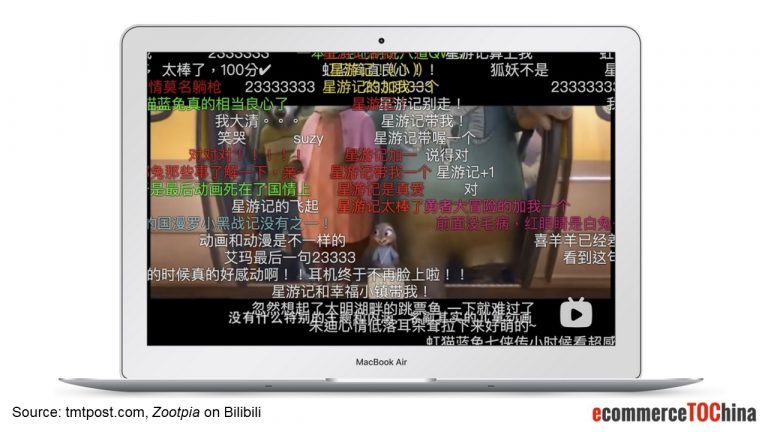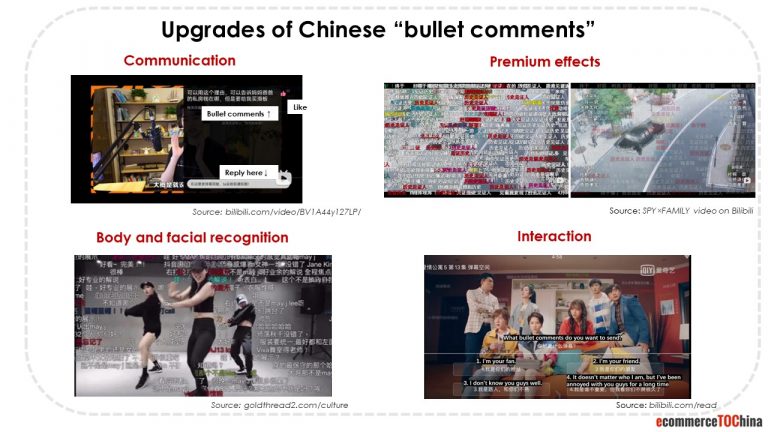What are “bullet comments”?
In general, “Bullet comments”, or “dan’mu” (弹幕) in Chinese are comments that float across the screen, just like flying bullets. It was first originated in the Japanese ACG industry and developed by a Japanese Cartoon site Nico Nico in 2006. The name “dan’mu” or “bullet comments” comes from the Japanese “danmaku” genre of shooter games. The Danmaku name translates to “bullet hell,” referring to how users are hit by a barrage of bullets in the gameplay.

Its features include:
- Space
Unlike normal comments, bullet comments float across the screen, just like flying bullets, and are displayed directly over the video content in the scroll bar. This makes bullet comments a part of the video content.
- Time
Bullet comments appear only at a specific video timestamp, acting as timed feedback on precisely what the viewer is seeing on the screen at that moment. This allows the viewer to become an editor while being a consumer of video content.
- Content
Compared to YouTube comments that often summarize opinions on the video, bullet comments are more diverse. The comments include the changing lines of the plot, instant interaction with other bullet comments, and explanation or translation of the content. This not only enhances the connection between the viewer and the video content but also improves the interactivity between viewers.
Where do “bullet comments” usually appear in China?
In China, “bullet comments” are not only limited to the AGC world but are transitioning into internet culture, especially among GenZ.
Almost all video platforms have the function of bullet comments. Bilibili (China’s hybrid between Twitch and YouTube) is the first and most active Chinese video platform where bullet comment culture is available. The total revenue of Bilibili reached 19.38 billion RMB in 2021. In Q4 2021, Bilibili’s monthly active users were 272 million, with about 2.2 billion average daily video views and 10.1 billion average monthly interactions.
Even several theaters have been incorporating this practice into special screenings that display streams of text messages sent in by the audience. In addition, some live streaming platforms have introduced “bullet comments” to get real-time communication with viewers
What upgrades have been made to the Chinese “bullet comments”?
- Communication
Users can interact with the comments posted by other users after clicking on them, they can like, unlike, share, reply, and report.
- Premium effects
Users can set different colors, font sizes, and effects of bullet comments to get custom premium effects. There are some effects that require VIPs to use, so it enhances the fun while promoting the VIP base. And since too many bullet comments will cover the content of the video itself, users as viewers can also set the transparency, display area, font size, speed, blocking content, etc. to get the most comfortable viewing experience.
3. Body and facial recognition
Bilibili rolled out the smart “block avoider” feature, which uses facial and body recognition to detect people, allowing the text to flow behind them instead of on top of them. This allows viewers to read bullet comments without missing key parts of the video.
4. Interaction
Bullet comments can make the video become a mini-game. When the video plays to the key plot, comments will appear for the user to choose, and through the user’s interactive choice, different branches of the plot will be given. This interactive mechanism greatly enhances the user’s sense of empowerment in the process of watching the video.

Bullet comments are going global?
It is unclear whether this trend will spread beyond East Asia. Although Youtube live streaming launched Superchat, which has a similar real-time feature to bullet comments, there are still many differences.
The lack of universality is a significant barrier to globalization. Bilibili’s users are predominantly Chinese while Youtube or Netflix users are from various countries. Language and cultural differences can make their understanding of the content different, thus weakening the social attributes of bullet comments, making them more confusing and separating.
Moreover, bullet comments could also be misused, such as offense, abuse, etc. The platform needs to have complete filtering and safeguarding measures to ensure that the content meets the regulations.
Conclusion
Bullet comments are more than just comments. The act of sending comments can give a sense of empowerment because the comments have become part of the video to be seen by other viewers. The variety of content and format also enhances the fun and interactivity of the bullet comments. Most crucially, when compared to acts like likes, comments, and reposts, the “synchronicity” of bullet comments breaks down geographical, time, and space barriers between audiences, and serves the immediate connection and social demands of young people. However, it also remains to be seen where the boundaries of bullet comments will lie in the future.
Want to have a first free consultation session about how to do marketing in China? Contact us.
